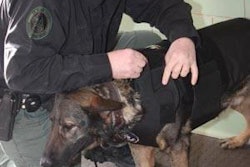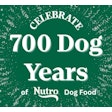Dogs' smelling skills may be improved by cutting protein and adding fats into the diet, according to new research.
A higher-fat, lower-protein petfood diet helps dogs return to lower body temperatures after exercise, which reduces panting and improves sniffing, researchers from Cornell's College of Veterinary Medicine and Auburn University found.
The US Department of Justice-funded study found that detection dogs are actually more reliable than was previously thought. The study was conducted in an Alabama, USA, detection dog research facility designed in conjunction with a military dog trainer. The facility provides expert detection dogs to police and military forces.
During the study, fumes in the facility were flushed out each time between tests to ensure a fresh detection field each time. "Previous studies from other facilities, which lack this feature, had suggested detection dogs signaling for suspect substances are about 70 percent accurate," said Joseph Wakshlag, associate professor of clinical studies and chief of nutrition at Cornell's College of Veterinary Medicine. "The lower numbers may have been due to study design flaws which our new study overcame. Dogs tested in the new facility signaled with 90 percent and above accuracy. We also found we can push detection performance even further with the right kind of food."
The study rotated 17 trained dogs over an 18-month period through three petfood diets: high-end performance diet, regular adult dog food and regular adult dog food diluted with corn oil. The high-performance and corn-oil diets were designed to have the same amount of energy from fat (57 percent), but the corn oil diet had less protein, with 18 percent compared to the 27 percent in regular and high-performance diets. Researchers then gauged how the different diets affected the different dogs. They found that d ogs that ate the normal diet diluted with corn oil returned to normal body temperatures quickest after exercise and were better at detecting smokeless powder, ammonia nitrate and TNT.
According to Wakshlag: "Corn oil has lots of polyunsaturated fats, similar to what you'd find in a lot of nuts and common grocery store seed oils. Past data from elsewhere suggest that these polyunsaturated fats might enhance the sense of smell, and it looks like that may be true for detection dogs. It could be that fat somehow improves nose-signaling structures or reduces body temperature or both. But lowering protein also played a part in improving olfaction.
"If you're a dog, digesting protein raises body temperature, so the longer your body temperature is up, the longer you keep panting, and the harder it is to smell well. Our study shifts the paradigm of what 'high-performance' diet can mean for dogs. It depends on what you want your dog to do. A sled dog or greyhound may need more protein to keep going. But detection dogs tend to exercise in shorter bursts and need to recover quickly and smell well. For that, less protein and more fat could help," said Wakshlag.


















